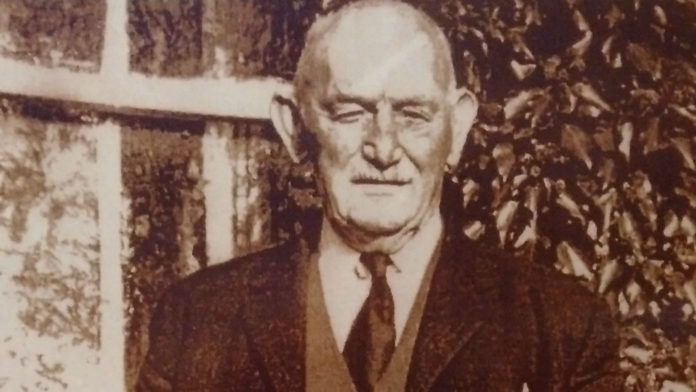
By Jim Fitzgerald, Chairman Knockraha History & Heritage Society
In any discussion of the War of Independence in Cork, the name of Martin Corry will invariably come up. But unfortunately many revisionist historians have a slanted view of his activities during the War of Independence, arising from the fact that none of them properly researched his activities, some even suggesting he was a psychopath.
During the War of Independence, Martin Corry was an uncompromising Irish Republican believing that military force was the only way to establish an Irish republic. But once the war was over and freedom had been attained, he severed all his links with militarism and from being elected to the Dail in 1927, he got in every election until he retired in 1969, topping the poll on many occasions.
As a politician, he devoted his life to bettering the lot of his constituents in North East Cork where he was a fearless fighter on their behalf. He was an extensive farmer and was a major beet grower. For many years, he was chairman of the Irish Sugar Beet Growers Association. He was much involved in the development of the Irish Sugar Industry and he was chairman for many years of Erin Foods in Midleton.
When he died in 1979, even though there was a strict rule that only parishioners could be buried in Midleton cemetery, the PP Canon Rea waved the rule because Martin did so much for East Cork. So he was buried near the church in Midleton.

NATIONALIST ROOTS FROM WEST CLARE
Martin was born in 1889. His family came from West Clare. His father was one of 13 who, to get employment, joined the Royal Irish Constabulary and by 1903 had risen to the rank of District Inspector based in Tuckey Street in Cork City. Martin claimed that his nationalism came from being with his grandfather in West Clare, a great nationalist area. In 1903, King Edward VII came to view the Cork Exhibition in the Mardyke.
It was Martin’s father who was overseeing the security of the King, but in spite of that Martin, as a pupil of PBC Western Road, with a few of his friends, organised a protest against the King, much to the annoyance of his father who after that, took him out of the city to Martin’s mother’s area in Mourneabbey. But there, he made the acquaintance of the future-to-be murdered Lord Mayor of Cork Tomás MacCurtain. So his father again moved him down to Glounthaune, where he said things were quieter.
When he came to Glounthaune, he immediately set about forming a Company of the Volunteers and he called a meeting in an unused labourer’s house in Ballinbrittig. A Company was set up and Martin was elected captain, a post he held up to the truce in July 1921. That cottage in which the Company was formed, became known as Liberty Hall, which is still intact. He started with 7 Volunteers, but by 1919 it had grown to over 90 with 18 girls in Cumann na mBan. It became known as E Company in the 4th Batallion and was part of the Cork No. 1 Brigade.
During the war, the branch did normal Company activities such as assisting the capturing of RIC Barracks in Carrigtwohill, Cloyne, the felling of trees to stop British re-enforcements, drilling mining roads, knocking bridges and was active as security for brigade officers when they were in the Knockraha area.
But by orders of Sean Hegarty, O.C. of the Cork No. 1 Brigade, they ran 2 underground factories for the making of hand grenades in Knockraha. All in all, they made over 3,000 grenades which were distributed nationally. The grenades were an important arsenal for the IRA and proved very effective. The moulds for making the grenades were manufactured in the Ford Motor Company foundry in the Marina by IRA Volunteers.
These were shown on TV this summer on ‘National Treasurers’ with John Creedon and were on display in the Museum of Country Life in Castlebar. In Kilquane graveyard in Knockraha, is an ancient vault which was used as a prison by the Cork No. 1 Brigade and it became known as Sing Sing where up to 100 prisoners were held and up to 25 Black n’ Tans auxiliaries and spies were executed out of.
This vault, which has been shown many times on TV documentaries, is still there in perfect order and is now a great tourist attraction. And it is the fate that awaited these prisoners that revisionist historians have blamed Martin Corry for. But Martin Corry was doing no more than carrying out the Brigade orders. If Martin Corry was never captain in Knockraha, whoever would have been captain would have to carry out the same instructions – so to tar Martin Corry with that brush is false and misleading.
COLOURFUL POLITICIAN
Martin joined Fianna Fail at its inception in 1926 and was elected in 1927, a seat he held until he retired in 1969. When he joined the Dail, he severed all his links with militarism, devoting all his efforts to promote the welfare of the people of North East Cork. In Dail Eireann, he was seen as a very colourful politician with very independent views of his own.
In Fianna Fail, he was one of the men who would stand up to De Valera. That was very evident in the case of Tomas MacCurtin Junior, son of the murdered Lord Mayor who was murdered in his bed in Blackpool by the RIC, which was witnessed by young Tomas. Tomas, even after the formation of the State, carried on activity in the Republican movement and for these activities he was sentenced to death in 1941 when De Valera was Taoiseach.
It was Martin Corry who led the campaign to get his death sentence reprieved. He told De Valera that if he hung Tomás MacCurtain, he would leave Fianna Fail and run against them in the next election. This was still no use, so Martin got onto De Valera’s wife, Sinead and the 2 of them persuaded De Valera to commute the death sentence.
Tomas was kept in jail for another 5 years and when he was finally released and came back to Cork, he was met at Kent Station by 5 bands and thousands of supporters. Martin often proposed many controversial measures in Dail Eireann.
DRINKING ON SUNDAY – A ‘GRAVE SIN’
The following is an example of a letter this writer received from Fr O’Donovan of Drimoleague about Martin Corry.

TRUE PATRIOT
Martin also proposed in Dail Eireann that commercial lorries should be allowed to have insurance to take supporters to GAA matches. It is fascinating to see, as in Martin’s case how a freedom fighter can change to diplomacy. In 1948 when Martin was 21 years in Dail Eireann, he was made a presentation of a writing desk by Fianna Fail in East Cork.
This presentation was made by Eamonn De Valera in the Commodore Hotel in Cobh. In the course of his address, Martin stated that in his young days he doubted that the pen was mightier than the sword. But the events that had followed since 1932 had proved that the saying was right; that realisation had come to him when he saw the Union Jack being pulled down on Spike Island and the forts of Cork Harbour being handed back to the Irish Nation. That day had shown to him the value of Statesmanship.
So Martin Corry was a true patriot in every sense of the word. His funeral in Midleton in February 1979 was one of the biggest funerals ever seen in East Cork with all political parties represented. A graveside oration was given by An Taoiseach, Jack Lynch. We shall not see his likes again.







